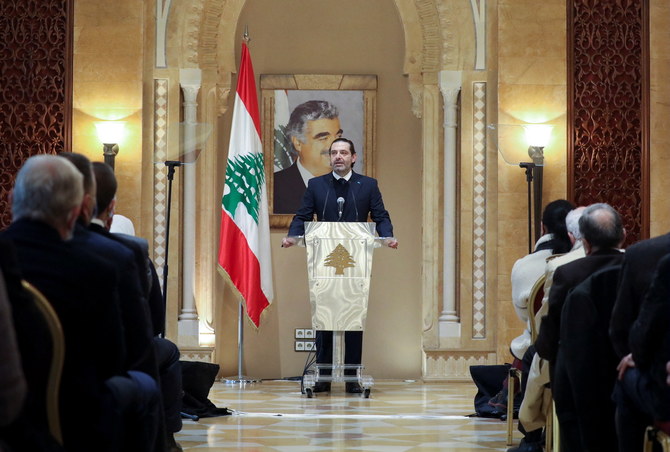
- ARAB NEWS
- 03 Jul 2025

BEIRUT: Former Lebanese Prime Minister Saad Hariri on Monday announced that he would not run in the upcoming parliamentary elections, suspending his political career.
Delivered with a sullen face, Hariri’s announcement came as a shock for his supporters and the political ruling team.
The 51-year-old three-time premier — who was propelled into politics after the 2005 assassination of his father, former Prime Minister Rafik Hariri — announced his decision at a press conference in Beirut.
He also called on the Future Movement, which he heads, to follow suit and not run in the upcoming parliamentary elections nor nominate anyone to run on its behalf.
Hariri expressed his conviction that this step was correct because “there is no room for any positive opportunity for Lebanon in light of the Iranian influence, international confusion, national division, rise of sectarian tensions, and the deterioration of the state.”
There is no room for any positive opportunity for Lebanon in light of the Iranian influence, international confusion, national division, rise of sectarian tensions, and the deterioration of the state.
Saad Hariri
Hariri said: “Our decision is to suspend any role or responsibility in the political power, the legislative, and politics in its tradition sense, and we, from our stance as citizens, will remain faithful to the project of Rafik Hariri to avoid the civil war and to work for a better life for all Lebanese.
“We will remain in the service of Lebanon and the Lebanese, and our house will remain open for the good will and for our kinship and loved ones from all over Lebanon.”
Hariri said that his decisions had “led to me losing my personal wealth, some of my foreign friendships, and many of my national alliances and even some comrades and brothers.”
Hariri repeated, through tears and clear discomfort, what his father said when he decided not to run for legislative elections 17 years ago: “I entrust this beloved country Lebanon and its good people to God Almighty.”
His ruling political team had believed that Hariri was manoeuvring until the last moment.
Hariri’s decision will have a significant effect on the upcoming legislative elections in May due to the absence of any Sunni leadership.
Hariri’s decision coincided with the decision of former Prime Minister Tammam Salam to also rule himself out of the upcoming legislative elections, noting that this might also apply to other former prime ministers.
Hariri had played a pivotal role in the Lebanese political equation and had the biggest role in electing Michel Aoun as president through a deal which he made with the Free Patriotic Movement, which later reacted against the agreement.
The head of the Lebanese Forces Samir Geagea had paved the way for this deal through an understanding which he made with the FPM and his endorsement of the candidacy of Aoun.
Hariri’s announcement came as the Cabinet held its first meeting in nearly three months.
During the meeting, Prime Minister Najib Mikati said that “the time remaining before the legislative elections is too tight.”
He added: “We will make our best to finish the essential issues related mainly to the daily lives of citizens, electricity, the budget and importing gas and oil.”
The Cabinet — headed by Aoun, and in the presence of Mikati — approved the draft budget for 2021, which included a series of social benefits.
The Cabinet also approved an increase in the value of transport allowance for the employees of the private and public sectors, the military, and the security agencies — provided that the draft budget of 2022 would be discussed in daily sessions before referring it to parliament.
In light of these decisions, Education Minister Abbas Halabi called on the educational bodies in public schools to return to teaching from Tuesday “and compensate for wasting an entire semester due to strikes and school closures.”
The Cabinet completed the process of appointing the six members of the National Anti-Corruption Commission.
The Minister of State for Administrative Development Najla Riachi Asaker said this step “reflects a tangible governmental tendency to make the expected reforms a reality.”
A few hours after the end of the Cabinet session, Lebanon started preliminary negotiations with representatives of the International Monetary Fund.
The video conference meeting focused on the reforms that Lebanon should undertake to become eligible for a support program.